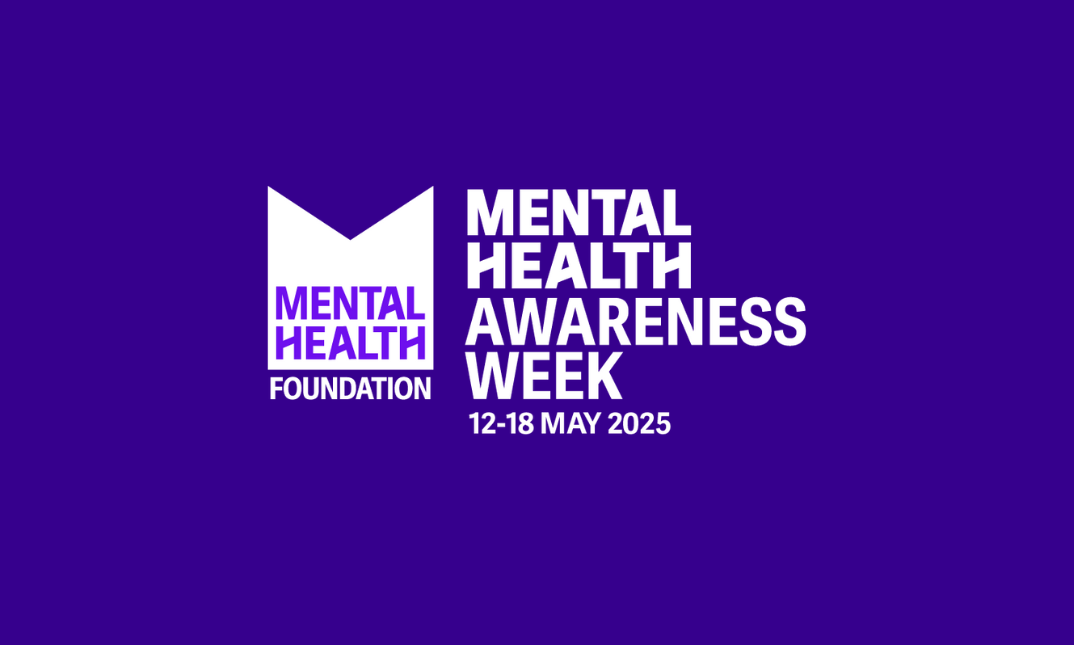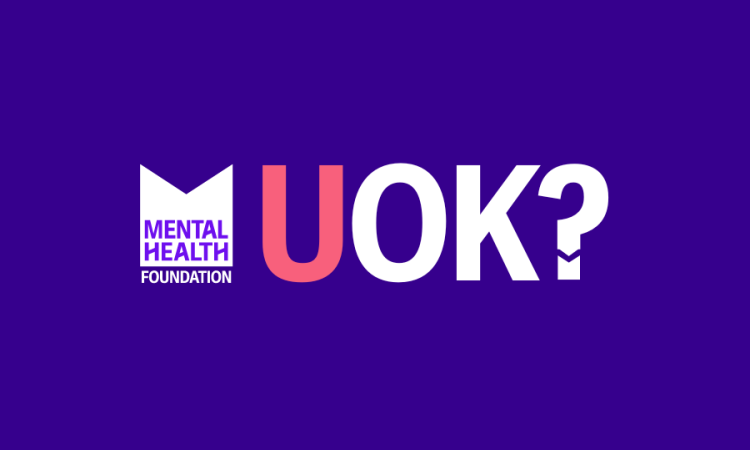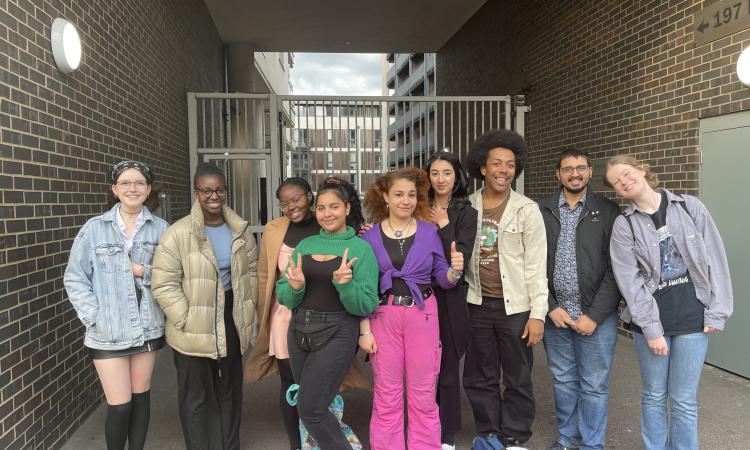Being part of a positive community is good for mental health and wellbeing. That’s why for Mental Health Awareness Week 2025, we’re celebrating the communities we belong to. Communities help us to belong, feel supported, and have purpose. From local to global, online to offline, we all need community.
With round-the-clock access and endless choice, it’s no wonder many of us find our communities online. From gaming chat rooms to knitting tips, a safe space to vent to a place for debate – online communities have a lot to offer.

No matter where you live, the online world can help you meet others who share your interests, aspects of your identity, or similar experiences – helping us feel connected.
A positive community should make you feel safe and good about yourself. But not all communities are good for our mental health. It’s important to recognise when a community is doing more harm than good, for example, if it makes you feel uncomfortable, unsafe, or think badly about yourself.
Read our tips, created with the MHF Young Leaders, on how to navigate online communities safely.
How can I find an online community to help my mental health?
There are lots of different online communities out there, depending on what you’re looking for. Some of us are more comfortable with opening up about our mental health on online communities. We might be less worried about judgment when we can share our feelings anonymously. If you’re struggling, mental health forums can be a helpful space, such as Mind’s online peer support community, Side by Side.


If you’re struggling with something that’s affecting your mental health, such as a long-term condition, difficult relationships, alcohol issues, or debt problems, you might want to connect with people with similar experiences who can understand. For example, if you have a long-term condition like diabetes, you might find it helpful to join a platform like the Diabetes UK forum. There are also Facebook groups that offer online peer support.
As well as community, there are other proven ways to boost our mental health, such as regular movement and spending time in nature. Many of us use online communities to connect with others with shared interests, or to help us get into something new. From finding a running club on Strava, to joining a WhatsApp group for bird-watching – we can use online communities to help us do more of the things that support our mental health.

There are many ways we can find online communities that help our mental health and wellbeing. What’s important is to recognise whether an online community is helping, or harming, your mental health. We go into this more below.
What are the benefits of online communities?
Online communities are very popular, because they offer so many benefits. Here are some of the benefits the MHF Young Leaders shared with us:
- Reliable and always there for you with 24/7 access
- Easy to find likeminded people can help you feel better
- You can discover different views
- A sense of belonging and acceptance
- A safe space to be vulnerable
- Easy to find people with a shared interest
- Connecting to people you wouldn’t otherwise meet
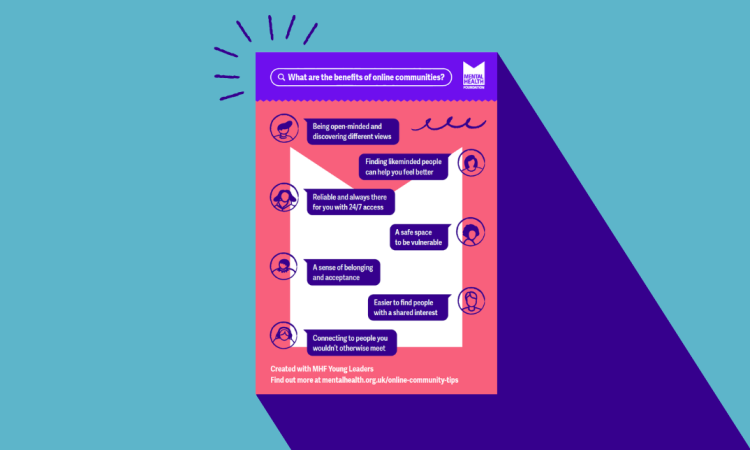
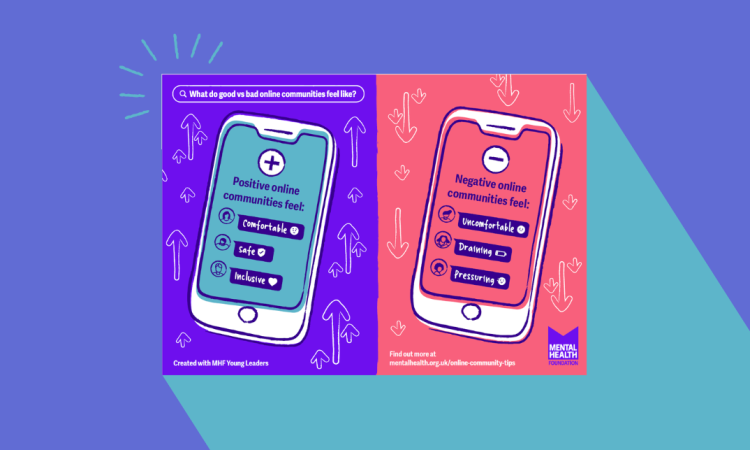
What do good vs bad online communities feel like?
While being part of a positive community can support our mental health, not all communities are good for us. It’s important to recognise when a community is doing more harm than good, for example, if it makes you feel uncomfortable, unsafe, or think badly about yourself.
Positive online communities feel comfortable, safe and inclusive. Remember, if a community doesn’t feel good for you, you should always feel able to leave it.
Top tips on safely using online communities for your mental health
There are actions we can all take to help us stay safe online. Here are some tips from the MHF Young Leaders on how they keep themselves safe while navigating online communities:
- Protect your privacy: avoid sharing your personal details with others online and check that your privacy settings are working for you.
- Set boundaries: be mindful of how the community is making you feel. Trust your instincts and remember you can take a step back or leave a community that isn’t benefiting you.
- Fact-check: don’t take information online at face value. Fact-check information and advice through trusted sources or talk it over with a trusted adult.
- Be aware of your digital footprint: when you’re sharing in online communities, remember that it’s hard to erase this later on. So be careful about what you share and consider the future impact.


Advice by and for young people to stay safe in online communities
The MHF Young Leaders share their advice on keeping safe online.
- Create a checklist: Have I fact-checked this? Have I protected my personal information? Does it make me feel better? Does it make me feel worse? Is it moderated? Am I taking enough breaks?
- Never do what people tell you to do online, particularly if it’s about your physical or mental health. Fact-check any advice and talk it over with others.
- Just because a community feels welcoming at first, doesn’t mean it always will be. Don’t become complacent and always check in on how it’s making you feel.
Looking after your mental health: online safety
Learn more about online safety and mental health in our blog.
Read our blog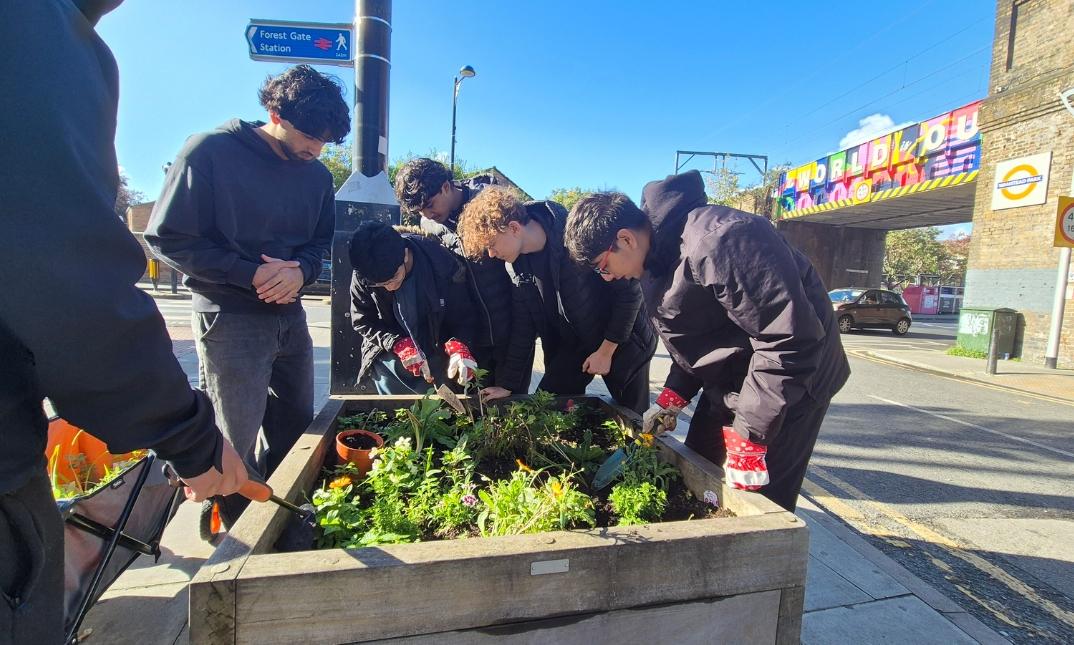
Mental health support for young people
If you're looking for mental health support for young people, these organisations can help:
- YoungMinds - for online advice and information
- Childline - talk to a councillor on 0800 1111 (open 24/7)
- The Mix - for online advice, or use the crisis messenger
Learn more about community and mental health
The theme of Mental Health Awareness Week 2025 is community - which is vital to good mental health and wellbeing. Learn more about community and mental health.
How community benefits your mental health

Online safety and community advice

The mental health benefits of community for parents

Mental Health Awareness Week 2025
This year, Mental Health Awareness Week is all about community. Learn more about our UK-wide awareness campaign for good mental health.
Get involved